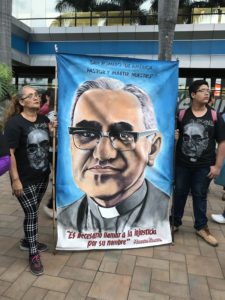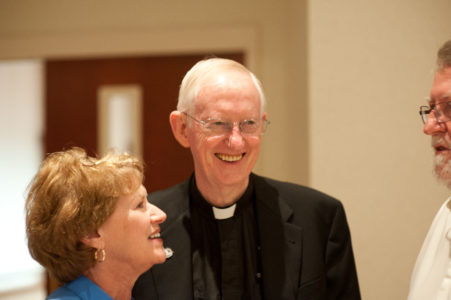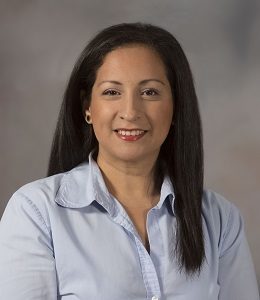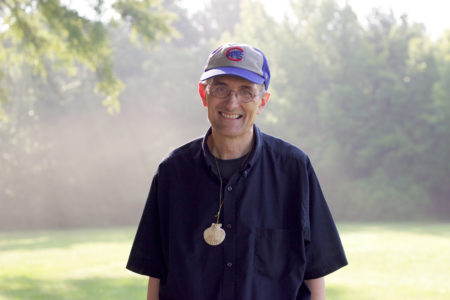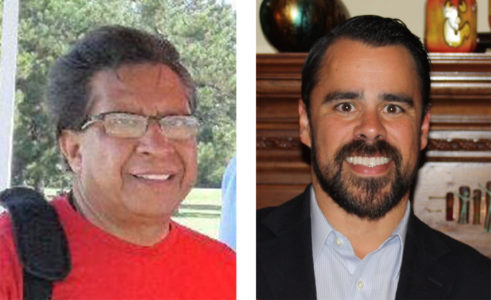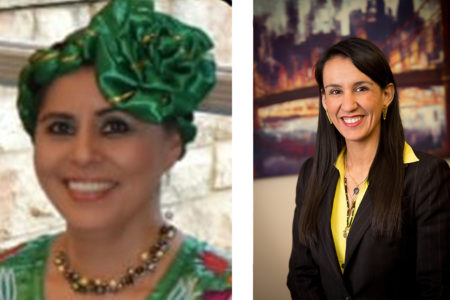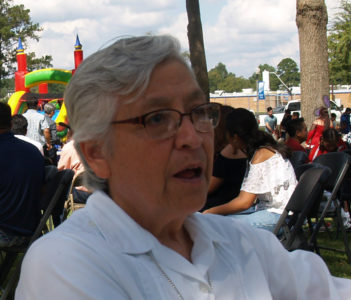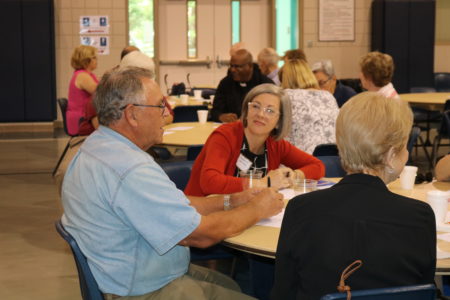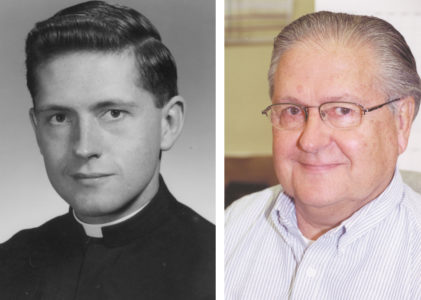Por Berta del Carmen Mexidor
GRAPEVINE, Texas – Con una reunión nacional culminó el ciclo del quinto encuentro. El conclave se celebró por tres días en Grapevine, Texas, desde el 20 al 24 de septiembre. Delegados de todo el país, seleccionados después de reuniones parroquiales, diocesanas y regionales, participaron en el V Encuentro, al llamado de los Obispos de los Estados Unidos para entregar a estos el resultado de múltiples consultas con los católicos, que incluyen, por supuesto los retos y planes de la comunidad latina/ hispana dentro de la iglesia católica.
La delegación de la Diócesis de Jackson, dirigida por el Obispo Joseph Kopacz, contó con excelentes representantes: Susana Becerril, María Isamar Mazy, quienes llevaron la voz de los más jóvenes y Danna Johnson , Sor María Elena Méndez, MGSpS, una de las coordinadoras del Ministerio Hispano para la diócesis y el padre Michael Mc Andrew, quienes resumieron las expectativas y experiencias para formación de fe, vocaciones y trabajo de comunidad.
El trabajo del V Encuentro termina donde comienza el VI Encuentro. Todos los delegados deben transmitir los resultados nacionales, comenzando con la réplica del mismo proceso de consulta a nivel de cada iglesia, diócesis y región. Este proceso llevará cuatro años más hasta concluir con una nueva cita nacional para cumplir con la tarea de ser discípulos misioneros.
A su regreso la pregunta a los participantes fue la misma-
P: ¿Qué experiencias resaltan del evento nacional del V Encuentro? Las respuestas no se hicieron esperar:
R: Isamar – Mi experiencia fue muy bonita viendo que la iglesia en estos tiempos de dificultad pudo unirse en oración y que los obispos fueron con sencillez y humildad a pedirnos a nosotros que rezáramos por ellos. Me impresionó la multitud de personas que hubo, éramos alrededor de 3,200 personas de todo los Estados Unidos y por parte del CELAM (Consejo Episcopal Latinoamericano) Monseñor Constantino Barrera Morales y el Obispo de Sonsonate de El Salvador trajeron jóvenes de Costa Rica y Brasil para escuchar nuestras experiencias. Contamos con la grata presencia del Nuncio Apostólico comisionado por el papa Francisco y su mensaje alentador fue de mucha alegría para nosotros cuando nos dijo que “somos un pueblo en marcha.”
R: Susana Becerril – Me llevo muchas cosas del V Encuentro, algunas buenas otras no tanto, pero todo me ha servido para aprender cosas urgentes en realidad, que quizá no creía necesarias. Me gustó que se habló de una integración de la comunidad estadounidense y la latino/hispana. Remarcaron que no somos invitados de la iglesia, nosotros somos iglesia, tenemos voz, tenemos derecho, pero más nada tenemos la obligación de hacer algo por los que más lo necesitan. Pero como dije al principio no todo fue tan bueno, siento que faltó más tiempo o no se usó el tiempo de manera proporcional para abordar todos los temas y para ser escuchados por los obispos.”
R: Danna – Como ya se nos había explicado antes de ir al encuentro nacional, la dinámica de estos tres días era continuar la metodología y espiritualidad del pasaje bíblico de los discípulos que van camino a Emaus y que refleja los cinco movimientos que el Papa Francisco presenta en la Alegría del Evangelio: Primeriar, involucrarse, acompañar, dar frutos y festejar.
De estos cinco movimientos, el que más me dejo marcada fue el de acompañar. El Obispo Daniel Flores de la diócesis de Brownsville, TX, nos decía en su presentación que para acompañar “debe existir el deseo de hacerlo.” Acompañar es presencia, tiempo, paciencia, escucha, mirada cercana y contemplativa, es nuestro “Muévete y detente ante la otra persona (move and stop before the other person)” al estilo de Jesús. Esto requiere “desinstalar nuestra cómoda condición de espectadores” nos dijo.
Yo regreso a mi vida ordinaria con esas palabras del Obispo Flores en mi memoria y corazón. ¿Cómo me hablan esas palabras en mi vida? El V Encuentro fue una oportunidad de apertura para ver con nuevos ojos las mismas necesidades, particularmente las del pueblo hispano en la iglesia católica en los Estados Unidos y aquí en Mississippi. Se habló mucho de la falta de atención espiritual (especialmente en los jóvenes), de los obstáculos de integración y de la falta de una formación integral en todos los niveles de liderazgo de la iglesia.
En medio de los escándalos y las crisis que pasa la iglesia católica actualmente, Dr. Hosffman Ospino nos dijo “el V Encuentro es un modelo de reflexión y acción, comunión en la diversidad. Es un gran momento de ser católico (a) e Hispano (a), una iglesia renovada, que requiere de una conversión pastoral autentica.”
R: Hermana María Elena – El V Encuentro nacional fue como un nuevo Pentecostés para la Iglesia Católica de los Estados Unidos. Participar en el proceso del V Encuentro fue un momento de gracia, una caricia, un abrazo afectivo y una luz que se enciende en la oscuridad en medio de este momento difícil para la Iglesia.
Desde que subí al avión que me llevaría a Texas mi corazón empezó a palpitar de gozo, pues sería parte de un evento que marcaría la historia de la Iglesia y de la sociedad de los Estados Unidos. También vino a mi mente la gran responsabilidad que llevaba conmigo el ser delegada de la Diócesis, pues los que no pudieron ir esperaban de vuelta el mensaje recibido.
El haber vivido el proceso en las parroquias, en la diócesis, en la región y ahora la nación, me hizo contemplar en conjunto los retos, sueños, oportunidades, posibilidades y responsabilidades que tenemos como hispanos dentro de la sociedad y de la Iglesia. En el evento me tocó caminar en la procesión de entrada como representante de Jackson y la región V. Caminar por el pasillo escuchando los gritos de gozo cuando se anunciaba a cada grupo que representaba a la región me llenó emoción. Caminar entre alrededor de 3,200 participantes de toda la nación, de una gran gama de ministerios, experiencias, diócesis y regiones era maravilloso. Esto me llenó de orgullo por ser hispana y mexicana.
Los tres días del evento, fueron de trabajo por regiones, interregionales y finalmente por áreas de ministerios. Aún cuando los días estuvieron llenos de actividades, hubo fiesta, música, baile y mucha alegría. A la vez, hubo tiempo para reflexionar en nuestros retos, limitaciones, oportunidades y sueños.
En general, los obispos nos motivaron a ser protagonistas, a formarnos, a pasar de espectadores a tomar liderazgo, a ir en busca de los que se han alejado de la Iglesia por cualquier razón y a ser misioneros, testigos del amor de Dios.
La que resaltó muy fuerte fue la pastoral juvenil y la necesidad de los roles de liderazgo de la mujer diciendo “escúchenos, acompáñenos, fórmenos e inviertan económicamente en nosotros”, estamos listos para tomar puestos de responsabilidad en la estructura parroquial y diocesana, confíen en nosotros.
Al final de todo, me sentí motivada y confirmada con lo que dijo Carl Anderson (Caballero Supremo de los Caballeros de Colón) sobre la Virgen de Guadalupe: “Nuestra Señora de Guadalupe está trabajando en la Iglesia de los Estados Unidos a través de la fe y las acciones de numerosos seguidores. Ella es muy relevante ahora, hay un milagro de Guadalupe hoy en este país” agregó
Yo creo la Virgen de Guadalupe, como lo hizo antes, nos va a unir como Iglesia Católica y como Continente Americano.
R: Padre Mc Andrew- Si bien las liturgias fueron hermosas, excelente música y había mucho que aprender, la parte más importante fue conocer gente de todo el país y escucharlos compartir historias de prueba, esperanza y fe. Fué genial ver a las nuevas generaciones de líderes con tanta energía. Los jóvenes en el V Encuentro energizaron el evento.
R: Bishop Kopacz- La comunidad latina ha crecido y evolucionado durante dos generaciones adicionales a través del nacimiento y la inmigración a casi el 40 por ciento de la Iglesia Católica en los Estados Unidos. El enfoque del V Encuentro es el reconocimiento a los latinos, llamados a asumir un mayor liderazgo en la Iglesia. La creciente presencia de católicos latinos y católicos asiáticos en este momento en la Iglesia de los Estados Unidos inevitablemente transformará la complejidad del liderazgo en el futuro. El V Encuentro trata de hacer esta transformación más intencional. A pesar de las sombras que oscurecen la misión y la visión de la Iglesia, el Encuentro estuvo marcado por una alegría generalizada, un considerable ánimo (espíritu), un amor entusiasta por el Señor y la Santísima Madre y una esperanza para el futuro (sigue adelante). (De su columna del 26 de octubre)
La misión de ser discípulos misioneros fue resumida por el padre Eduardo de la Región XI con una frase que aprendió sobre hispanos / latinos: “Los misioneros pacíficos de Dios (pachangeros) son aquellos que se entregan, los que saben cómo dar la bienvenida y los que están contentos.

